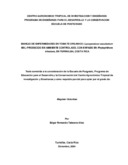Manejo de enfermedades en tomate orgánico (Lycopersicon esculentum Mill.) producido en ambiente controlado, con énfasis en Phytophthora infestans en Turrialba, Costa Rica
Alternative title
Disease management in organic tomatoes (Lycopersicon esculentum Mill.) produced in a controlled environment, with emphasis in Phytophthora infestans in Turrialba, Costa Rica
Description
Tesis (Mag. Sc.) - CATIE; Turrialba (Costa Rica), 2004 73 páginas 12 ilustraciones, 8 tablas 21.59 x 27.94 cm. Bibliografía páginas 50-54
Abstract
El propósito de la investigación fue determinar si las mezclas y otros productos orgánicos que el agricultor usa, junto con prácticas de manejo bien efectuadas, representan una opción para mantener las enfermedades del cultivo, como P. infestans, a niveles bajos de severidad. La aplicación de los tratamientos fue primero realizada en foliolos desprendidos en laboratorio y los mejores tratamientos fueron aplicados en plantas producidas en invernadero experjimental del CATIE. Veinticuatro horas después se inoculó con P. infestans (concentración 3 x 10 exponente 4 esporangios/ml). Después de 48 horas se realizaron observaciones diarias del desarrollo de la enfermedad hasta que el testigo alcanzó el 100 por ciento de infección. Por otro lado, en Producción comercial bajo ambiente controlado también se evaluaron mezclas orgánicas junto con todas las labores que el productor efectúa recomendadas para la Producción de tomate. Se concluye que el uso de las mezclas y prácticas culturales disminuye la severidad de la enfermedad y aumenta la Producción. Por lo tanto, representa la mejor alternativa orgánica para el manejo de enfermedades, principalmente para P. infestans. The objective of this research is to determine if the mixtures and other organic products used by the farmer along with other good management practices can be an option to maintain the crop diseases such as P. infestans at low severity levels. Treatments were first applied to loose folioles in the laboratory and the best treatments were applied in plants produced in the CATIE experimental greenhouse. Twenty four hours later, they were inoculated with P. infestans (with a concentration of 3x10 exponent 4 sporangium/ml). After 48 hours, disease growth was observed daily until the control reached 100 percent infection. In commercial production in a controlled environment, organic mixtures were also evaluated along with all of the recommended tomato production practices implemented by the farmers. It was concluded that the use of the mixtures and cultural practices decreased the disease severity and increased production. Therefore, this is the best organic alternative for disease management, especially for P. infestans.
Keywords
Asesor
Sánchez, V
Publisher
CATIE, Turrialba (Costa Rica)
Is part of
Magister Scientiae en Agricultura Ecológica
URI (Permanet link to cite or share this item)
https://repositorio.catie.ac.cr/handle/11554/4799Collections
- Tesis [3118]


